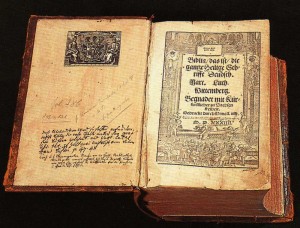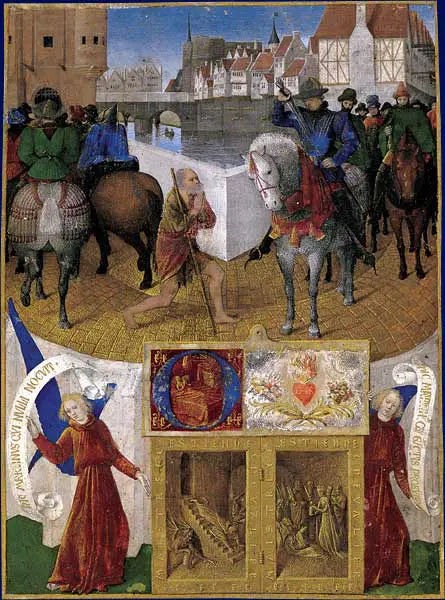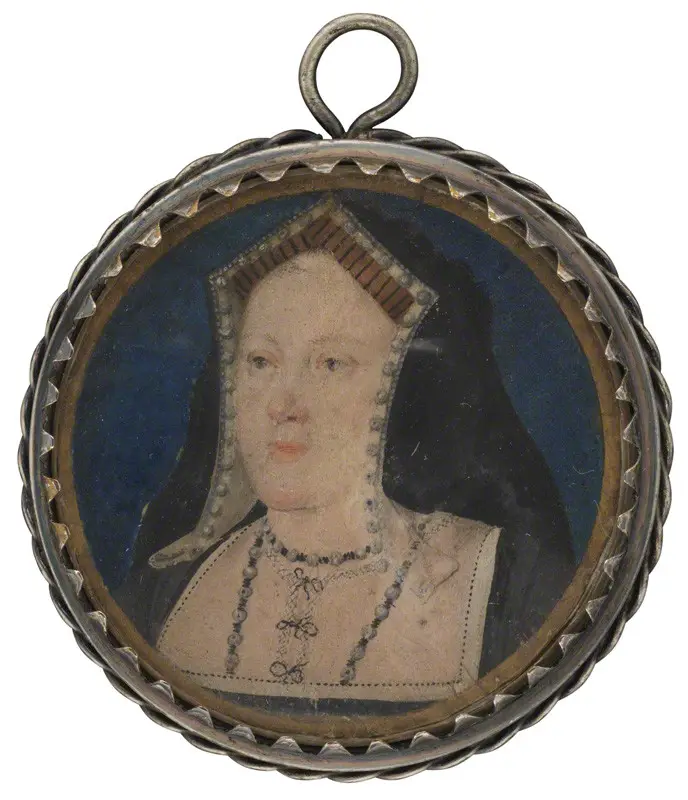 Today is the anniversary of Martin Luther's birth in 1483, so regular contributor Heather R. Darsie joins us today with an article on this fascinating man and his influence on the German language.
Today is the anniversary of Martin Luther's birth in 1483, so regular contributor Heather R. Darsie joins us today with an article on this fascinating man and his influence on the German language.
When you go to bed in the evening, take something from the Holy Scripture with you to bed, in order to consider it in your heart and – the same as an animal – ruminate over it and gently fall asleep. It should not be much, but rather a little, but a good thing to go through and understand. And when you get up in the morning, you will find your profits from the previous day.*
These were Luther's feelings about the meaning of the Bible, and perhaps also a glimpse into his feelings about a person's relationship with God.
Martin Luther changed the German language forever with his translation of the Latin Bible. Finally all German people, and not only the educated, could read the Bible. Luther unified the Germans because they received a common form of the German language. Luther's Bible created a uniform style for the language that could serve as a reference.
Luther was born on 10 November 1483 in Eisleben, Thüringen. In 1501 he went to the University of Erfurt. He received a Master of Arts degree in 1506. Later on he studied theology at Wittenberg, and then in 1511 Luther became a professor there. Later, Luther struggled against the papacy and thusly changed the feelings of the German people toward religion.
After Luther was excommunicated in 1521, he translated the Bible. Luther's translation of the New Testament was printed in 1522. He used common German and not scientific or learned German. Luther created his translation from Latin, Greek, and Hebrew versions of the Bible. He used a form the Middle German dialect, in particular drawing from the dialect used by the royal Saxon court. The German found in Luther's bible is mostly from eastern Germany. Sometimes, "Bible German" had grammatical and orthographic elements of upland German.
In the 16th century, many people were poor, but more and more could read books than in the past. Mostly, people read farces and chapbooks, but they also read religious texts. These texts were not from the Bible, but rather books for personal edification. By this time, the printing press had already been invented. The printing press was very important for common people, because there were finally books that everyone could read. These books were also very quickly printed. Further, during this period, the bourgeoisie became bigger and more powerful. When Luther translated the Bible, the bourgeoisie was able to read the Bible. No one had to rely only on the priests again.
Luther saw the mastery of the mother tongue as an important task. He recommended the acquisition of foreign languages, because, among other things, such knowledge could dampen conflicts between individuals. Throughout his life, Luther gathered insights and knowledge from the innate nature of being multi-lingual. He was skilled in the Greek, Hebrew and Latin languages. He sought to have foreign languages taught in schools. Luther wanted to make the use of his native language more common in the religious sphere. He thought that familiarity would lead to mutual clarification of languages and also to improve one's own language. He also noticed substantial differences between individual languages.

Luther's Bible
Luther popularized the dialect of the royal Saxon court. This dialect was relatively new because the Emperor Maximilian (1493-1519) wanted to speak High German, as he was from Austria. Because of this, Austrian German was the standard. Unfortunately, this language was not pretty. It was simply sufficient. Luther used this dialect as the basis for his translation.
Through the dissemination of his Bible. Luther gained an assured influence over the development of Early New High German language. Through the translation of the Latin Bible, Martin Luther changed the German language forever. He united the Germans, through a common form of the German language. Luther's Bible created a uniform style for the German language from which everyone could draw and point to.
In closing, a quote from the Bible is appropriate:
And the LORD said, Behold, the people is one, and one language among them all, and this is the beginning of their actions; now nothing will be restrained from doing everything they set out to do. Come, let us go down, and there confound their language, that they may not understand another language! So the Lord scattered them from there to all countries, and they left off to build the city.
If you're interested in finding out more about Luther and the German language, you'll be interested in this radio programme "Luther and a Language for All Germans":
Heather R. Darsie lives in the United States with her family and three parrots. She works in the legal field, with a focus on children. She obtained a Bachelor of Arts degree in German Languages and Literature, then a Juris Doctorate in American jurisprudence, and studied abroad in Costa Rica and France. Heather has always loved history. She first became acquainted with Elizabeth I when she was in middle school and chose to write a book report about her. Since then, she has always held an interest in the Renaissance and its numerous enigmatic citizens, with particular focus on the history of England and Italy. She is currently working on a book on the heraldry of Tudor women and is also researching Anne of Cleves.
Notes, Sources and Suggested Reading
*Please note that Ms. Darsie performed all translations for this article.
- “Zitate über die Bibel - zum Jahr der Bibel 2003”. http://dreifaltigkeit-altdorf.de/zitate_bibel.htm Retrieved 5 November 2015.
- “Ein man verändert das Angesicht Deutschlands: Martin Luther”. http://www.derweg.org/mwberdeu/luther.html. Retrieved on 5 November 2015.
- “Luther and the German Language.” www.luther.de/en/sprache.html Retrieved on 5 November 2015.
- Waterman, John T. A History of the German Language, with Special Reference to the Cultural and Social Forces that Shaped the Standard Literary Language. Seattle, University of Washington Press. 1966.
- Wolf, Herbert. Martin Luther: Eine Einführung in germanistische Luther-Studien. J.B. Metzlersche -verlagsbuchhandlung und Carl Ernst Poeschel Verlag GmbH in Stuttgart 1980. Druck: Gulde-Druck, Tübingen.
- Russ, Charles V.J. Historical German Phonology and Morphology. Oxford, Clarendon Press/ New York, Oxford University Press, 1978.
- Rössing-Hager, M. Syntax und Textkomposition in Luthers Briefposa. Köln, Wien, Böhlau, 1972.
- Kooiman, Willem. Luther and the Bible. Philadelphia, Muhlenberg Press. 1961.
- Baylor, Michael G. Action and Person: Conscience in Late Scholasticism and the Young Luther. Leide, Brill. 1977.
- Die Bibel. 1 Mose 11,6 – 11, 8.
- Brain, Denis. FLGE 321 Materials Packet. Fall 1997.



Excellent brief treatment Luther’s influence on the German language, as it came down to us today. I have my BA in German an have taken a few graduate courses as well. I enjoy the scriptures as well, and have my M.Th. (similar to the M.Div.)
bababooey
Very interesting and insightful article about Martin Luther’s influence on the German language. My interest in reading this article started from a post about a poem supposedly written by Martin Luther in English. The poem rhymed very well in English and I was wondering if Martin Luther spoke and wrote in English also or if that poem was translated from German.